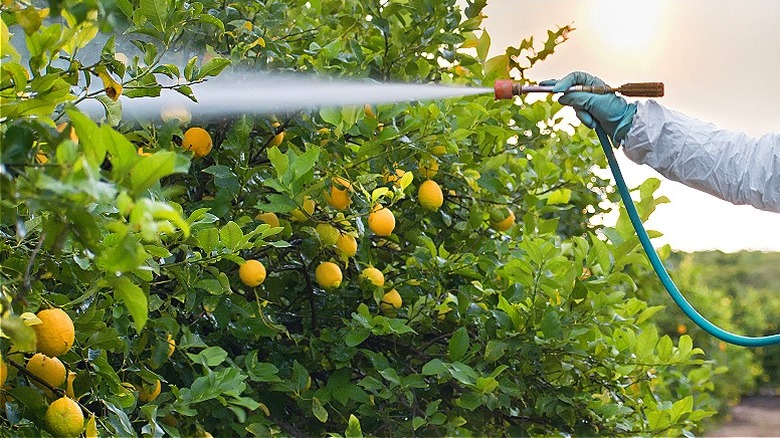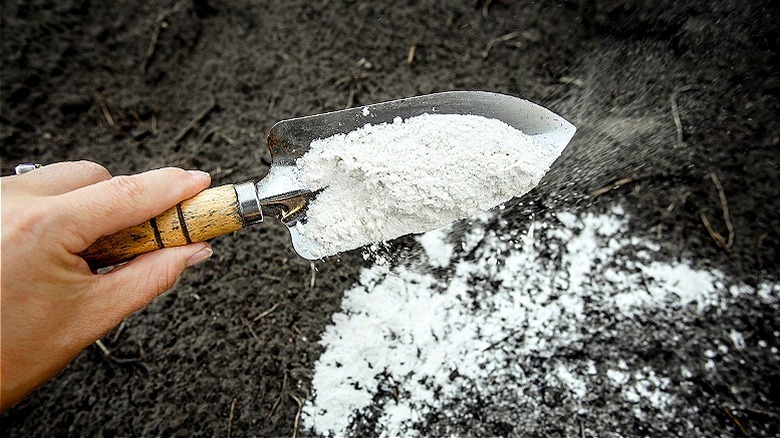Garden Trees, Shrubs & Vines
Kyle Schurman
Non-ideal growing conditions can impact the health of citrus trees, like poorly draining soil, nitrogen deficiency, and too little or too much water. Another problem for citrus trees, however, comes in the form of pests — specifically ants. If you spot ants on your lemon or orange tree, it could mean one of two likely things: You have aphids, or the (fire) ants are after the sap inside your tree. In the latter’s case, these ants could even kill your tree. To prevent either scenario, though, you’ll want to find a way to keep the ants at bay.
Methods for expelling ants from your yard’s citrus tree include applying natural oils, washing the ants out, and sprinkling powder around the tree’s base. If the ants visiting your tree aren’t fire ants, then the chances are good you actually have an aphid problem and not an ant one. The ants are actually after what the aphids are leaving behind as they suck on the sap of your young tree’s leaves: honeydew. So, if this is the case, after getting rid of the ants, you’ll also want to get rid of the aphids so the ants don’t return.
Spraying citrus trees with ant-repelling natural liquids

David Moreno Hernandez/Shutterstock
To defend your citrus tree from ants naturally, consider essential oils. Try mixing water with witch hazel and 20 drops of essential oil in a spray bottle. As for the best essential oil to banish ants, look no further than peppermint (an essential oil that’s also effective against aphids). Most ants don’t like the odor of mints, so using essential oils that come from the mint family will deliver desirable results, and peppermint and spearmint oils work especially well.
An alternative solution, however, is to use vinegar, garlic, and citronella oil. With your mixture, spray the leaves and stems of your yard’s citrus tree, as well as around the entire circumference of the trunk. This perimeter will serve as a kind of obstacle for the ants, and, should they break through, they’ll have to navigate the spray (that is, odor) all over the tree, too. Note, you may need to reapply the spray after it rains.
Speaking of water, another option is to simply wash away the ants (and aphids) on your citrus tree with a powerful blast from your garden hose. Doing so will not only expel the insects from the tree but also the honeydew the ants were after in the first place. For this method, you’ll want to repeat the process every few days for about 10 days. In the case of fire ants, try locating their nest and then douse it with water or use diluted lemon juice to cover up their scent trail home.
Eliminating ants with substances and powders

FotoHelin/Shutterstock
If you suspect ants are killing your lemon or orange tree, beyond expelling them, you can also try making it more difficult for the ants to return. For instance, you could create an obstacle for the ants by applying a sticky substance around the base of the tree. This will prevent the ants from climbing higher. For this method, wrap the bottom of your tree tightly with a material like vinyl tape (about 4 to 8 inches in height), and then cover it with a substance like Tanglefoot that consists of vegetable waxes, castor oil, and natural gum resins. Ants shouldn’t be able to navigate the barrier and ultimately will look elsewhere.
Another method is to add powder around the base of the tree, similar to the perimeter made with essential oil(s). Ants will avoid crawling across the powder and will be unable to reach the trunk. You could try using talcum powder or sprinkling powdered chalk.



